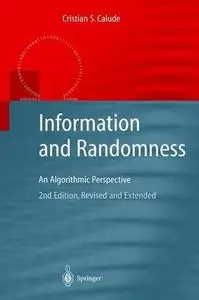Information and Randomness: An Algorithmic Perspective by Cristian S. Calude
English | PDF | 2002 | 481 Pages | ISBN : 3540434666 | 37.2 MB
The first edition of the monograph Information and Randomness: An Algorithmic Perspective by Crist ian Calude was published in 1994. In my Foreword I said: "The research in algorithmic information theory is already some 30 years old. However, only the recent years have witnessed a really vigorous growth in this area. . . . The present book by Calude fits very well in our series. Much original research is presented. . . making the approach richer in consequences than the classical one. Remarkably, however, the text is so self-contained and coherent that the book may also serve as a textbook. All proofs are given in the book and, thus, it is not necessary to consult other sources for classroom instruction. " The vigorous growth in the study of algorithmic information theory has continued during the past few years, which is clearly visible in the present second edition. Many new results, examples, exercises and open prob lems have been added. The additions include two entirely new chapters: "Computably Enumerable Random Reals" and "Randomness and Incom pleteness".

















